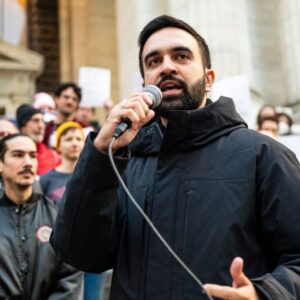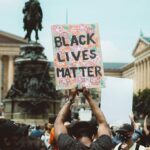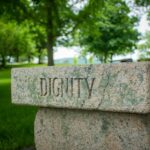
Black and Jewish Americans have been occasional allies in a US reality that continues to do violence to both. A few years ago, Marc Morial, president of the National Urban League, contended that “there’s no (cross-racial) alliance more historic, nor more important, than the alliance between Black Americans and Jewish Americans.”
These days, however, that historic alliance stands on very shaky ground. Recent polling reveals that current-day struggles against anti-Semitism and racism are often perceived to be at odds with each other. Overcoming this divide will not be easy. But at a pivotal moment when anti-Semitism, racism, and violence endemic to both are intensifying, we have an opportunity to reconsider ways to bridge this divide.
Both of us participate in antiracist and anti-Semitism work. One of us (Goldman) is White and Jewish. The other (Galvin) is Black and an African-Centered Christian. We both see the potential for common ground, with the recognition that we won’t get there without acknowledging and countering the forces that have been tearing our communities apart.
Struggles against anti-Semitism and racism are often perceived to be at odds with each other. Overcoming this divide will not be easy.
A Jewish Perspective on the Possibility for Black–Jewish Solidarity
Until we are all free, we are none of us free.
Injustice anywhere is a threat to justice everywhere.
Recently, while keynoting an internal learning program at a major Jewish institution, I (Goldman) administered an anonymous live poll about equity, belonging, inclusion, and diversity (EBID)—the language used in this organization for what is often referred to as “DEI.” There were two multiple choice questions, asking respondents to reflect on their personal beliefs and their sense of where their organization stands. The answer choices were the same in both cases:
- EBID helps fight anti-Semitism
- EBID contributes to anti-Semitism
- EBID has no impact on anti-Semitism
Perhaps feeling liberated by anonymity, 28 percent of respondents said EBID contributed to anti-Semitism (62 percent said it combated anti-Semitism and 10 percent said it had no effect). Even more alarming, 49 percent of respondents said their organization sees EBID as a contributor to anti-Semitism, while only 40 percent said their organization sees EBID as a tool to combat anti-Semitism and 19 percent said their organizations see EBID as having no effect on anti-Semitism, positive or negative.
Of course, Jewish skepticism around DEI is just one sign of a diminished partnership. A decade ago, in an editorial calling for a renewed alliance on the occasion of the 50th anniversary of Freedom Summer, the editorial board of Jewish Current noted, “In general, Jews of older generations [emphasis in the original] felt a kinship with African-American suffering and resistance more readily than young Jews do today.”
Opposing Israel’s current leadership is very different from intrinsic hate toward Jews generally. The former is a political opinion, and the latter is anti-Semitism.
In short, even though today many young Jews do participate in alliances with Black liberation activists, it is all too clear that the struggles for Black liberation and anti-Semitism have become very separate movements. But this survey quantifies something even worse: a pervasive “zero sum” belief among individuals and organizations that one group’s liberation depends on another’s continued oppression.
The Demise of a Historic Alliance
How did what is often characterized as a powerful civil rights alliance come apart? There are many causes. One factor may be Jewish assimilation into the US (White) mainstream. Like the Irish, Jews, regardless of whether they were of North African (Sephardim) or European (Ashkenazi) descent, were not always perceived in the US polity as “White.”
As recently as the 1960s, at Yale University, for example, there was a cap on admissions of Jewish students. The common elements shared by structural racism and structural anti-Semitism (that is, anti-Semitism as de facto institutional policy) helped build bonds of solidarity. As Jews became White, however, the pulls of solidarity inarguably weakened.
The Impact of Gaza
Adding to the division has been a dangerous—and often very cynical and intentional—conflation of opposition to Israel’s mass killing of Palestinians in Gaza (nearing 100,000 people, mostly civilians, according to the Israeli publication Haaretz) with anti-Semitism.
Opposing Israel’s current leadership is very different from intrinsic hate toward Jews generally. The former is a political opinion, and the latter is anti-Semitism.
In this environment, Black people (and others) who express solidarity with the people of Gaza have been regularly accused of anti-Semitism. Distorting the definition of anti-Semitism to incorporate an unrelated political agenda has been promulgated both by some Jewish organizations and many right-wing groups.
For the groups perpetuating this idea, it is an inconvenient fact that, on college campuses in particular, Jews themselves make up a substantial portion of protest participants. For many Jews, fighting oppression is ingrained in our culture and values and communicated at a very early age. This is the meaning of the post-Holocaust mantra, “Never again.”
Throughout history, Black people have experienced broken promises from a nation designed to kill us.
For example, the international refugee assistance organization, HIAS (originally the Hebrew Immigrant Aid Society) explained, “We used to help refugees because they were Jewish; now we help refugees because we are Jewish.” HIAS played a major role in the context of the Syrian refugee crisis—and took a strong stand against President Donald Trump’s family separation policy in 2018, seeing the obvious connections to fundamental Jewish values and the Jewish experience.
These realities, however, do not deter supporters of the Israeli government from disingenuously conflating Gaza solidarity with anti-Semitism to keep liberation movements off-balance and disoriented. Another result of this political redefinition is an effective diffusing of the struggle against genuine anti-Semitism at a time when it is unquestionably on the rise.
A Black American’s Perspective on the Possibility for Black–Jewish Solidarity
There is no European answer for African problems.
Ubuntu. I am because we are.
I (Galvin) certainly will not pretend to speak for all Black people as it relates to the question and possibility of Black–Jewish solidarity. Nevertheless, I discern that there is at least a microcosm of Black people who might resonate with what I have to say. Others may challenge what I’m offering here. I welcome both and all points in between.
Throughout history, Black people have experienced broken promises from a nation designed to kill us. In the quest for freedom and justice we have (perhaps naively) placed our hope in alliances and multiracial coalitions. We made “strategic” and tactical calculations with the expectation that America would eventually deliver the freedom she so energetically espouses—if we fought hard enough, if we were committed enough.
To our disappointment, there have been too many times when people who professed to have our best interests in mind have sold us out. Even though we couldn’t always perceive it clearly, people have portrayed comradeship while they were at the same time exploiting us. And when alliance became too costly or inconvenient, Black people’s interests were traded away.
I have to start here, knowing that any possibility for Black–Jewish solidarity in this moment of acute violence and assaults on our humanity requires levels of candor, vulnerability, risk-taking and grace—perhaps at levels we’ve rarely or never expressed toward each other.
Reflections on Black–Jewish Relations Today
In the American context, the most ironical thing about Negro anti-Semitism is that the Negro is really condemning the Jew for having become an American white man—for having become, in effect, a Christian.
Baldwin, one of our greatest prophets, offered this pithy and piercing analysis in a 1967 New York Times opinion column. I recall offering a perspective that resonates with this insight on three different occasions to Jewish colleagues in my network—even before I was aware of his assertion. They seemed to be surprisingly unaware of this reality. Nevertheless, the shape-shifting capacity and the alluring power of Whiteness makes this truth predictable and almost inevitable, whether people are conscious of it or not.
Punchline: Jewish people are able to traffic in the power and privilege that comes with Whiteness. At the same time, Jewish people are being targeted by and in some cases confronting Whiteness, as my coauthor attests above. How some Jewish people are negotiating this tension is not lost on Black people.
In this current moment of social and political precarity, and as the “empire strikes back” and disrupts the possibility of cross-racial solidarity, the rewards of Whiteness are once again being dangled—seductively, coercively—before Jewish people. How will they choose?
Baldwin makes the point that Jewish people, by virtue of their assimilation into White echelons, have access to much of what is still denied to Black people. Consequently, witnessing this reality along with the choice to be White understandably sparks a sense of betrayal and hesitancy that serves to undermine the possibility for solidarity between us.
As Jewish people negotiate and maintain these so-called privileges, Black people have pariah status in a nation that brought many of us to its shores against our will. Our mere presence in the United States is aptly characterized in W.E.B. Du Bois’s question to the Black nation in his seminal book, The Souls of Black Folk: “How does it feel to be a problem?”
And to the point of moral currency, Blackness remains demeaned and devalued while aspects of Jewish life and religion are conveniently legitimated. Any moral capital that might accrue to Blackness was necessarily and ingeniously created by us.
Why Build Bridges?
As a consequence of all these things (and others), many Black people approach the possibility of deeper solidarity with Jewish people with suspicion and tentativeness. We ask ourselves (and rightly so!), can the freedom we envision for our people be achieved in the context of coalitions—in this case with Jewish people?
I’m sure Jewish people are asking similar questions of themselves, as they should. While we do so though, and as the empire continues to maneuver between us, relations between Black people and Jewish people will likely remain strained.
Meanwhile, fascism and racism are intensifying and accelerating in the United States—and in many other nations for that matter. This reality is being rapidly advanced and provoked by the rise of authoritarian governments, artificial intelligence, and cyber-economic development, which will undoubtedly capitalize on preexisting social hierarchies that already privilege Whiteness, and other advantaged identities (male, hetero, Christian, wealthy). In this context, Black and Jewish people—along with those of other disadvantaged identities—face an acute moment of danger. But in danger there is also opportunity.
Changing the course of Black–Jewish relations at this difficult moment will require decolonizing our consciousness.
With both challenge and possibility before us, nothing can happen unless we are clear-eyed and candid about the fundamental cause of the division between us: White supremacy. It is in fact at the core of oppression, exclusion, and violence in the nation. It is informed and validated pseudo-Christian values that are comingled with racialized, extractive, violent capitalism.
Black people and Jews have had traumatic encounters with these forces—Black people in the context of the transatlantic trafficking of Black bodies (the African Holocaust), Jim Crow, and as targets in a shapeshifting empire designed to kill Black people and their futures—Jews in the context of the Holocaust, and unrelenting attacks against their humanity throughout history. If we don’t choose each other now, we may never get the opportunity to do so again.
As hard as it is to say, it very well could be that that the current moment has become so difficult and harrowing that Black people and Jewish people might be forced to be in solidarity with each other, charged with the possibility of “saving ourselves from this wicked generation” (Peter, Acts 2:40)—and maybe saving the nation in the process.
Where Do We Go from Here?
As individuals and within our own communities, we must courageously explore our histories of convergence and divergence in the undulating relationship between Black people and Jews at different times and in different places.
But it’s more than interrogating our histories more thoroughly. Changing the course of Black–Jewish relations at this difficult moment will require decolonizing our consciousness and a process of healing from racist and anti-Semitic culture, norms, and worldviews.
- Jews Must Confront Their Relationship with Whiteness
A key to unlocking the contemporary tension between Jews (even activists) and Black people is a more explicit conversation about the evolving relationship between Jews and Whiteness since their arrival in America. Historically, this is a powerful explanation for the divergence of Jews and Black people, so confronting that process, including the contributions of non-Jews to it, will be critical for a convergence.
The growing number of Jews in America, Israel, and around the world standing up against the inhumanity, destruction, and tyranny in Gaza is a rejection of tribalism and an essential identification with Palestinians—and all peoples who suffer the types of oppression that Jews have known at different points in history.
But realizing the full potential of that unity will require a sober understanding of Jewish privilege in the context of Whiteness. Beyond apologies, the goal is to understand it, acknowledge it, and use it pragmatically to contribute in unique ways to the liberation of all peoples experiencing oppression.
- Black People Must Purge Themselves of White Supremacist Theology
Invoking Baldwin again, any anti-Semitism that Black people have been exposed to happened largely via White evangelical theology and the interests it sacralizes and validates. These perspectives inform the design and shape the contours of the US empire and its foundations. In their own process of surviving and negotiating with Whiteness, Black people have internalized these poisonous perspectives, ones that have an outsized and frankly unhealthy influence on Black people’s moral universes and choices.
To quote Noel Erskine, long-time professor of theology and ethics, it is time for Black people to decolonize (White Supremacist) theology and to embrace and model the best of Black liberation and womanist theologies, which can repair the damage caused by worldviews meant for our demise, grow solidarity among Black people and by extension to our Jewish sisters and brothers.
- We Must All Fight Together for Reparations
Having Jewish people stand on the front line with Black people in the fight for reparations would go a long way to move Black and Jewish people toward deeper and more authentic solidarity.
There is a real consensus about the import and success of the reparations program with Germany and the international community in the aftermath of World War II. It was successful because, while nothing can compensate for the devastation of a people, the process proved to be a relatively effective method for unequivocally acknowledging profound harm, systematically locating and returning stolen assets, and symbolizing the remaining harm with additional cash transfers to the families of Holocaust victims.
Fighting for and achieving reparations for Black people is an opportunity to build unity and advance an even larger vision: reparative justice, reconciliation, and healing in the United States. A precursor and onramp for this work could include an effort that models truth-telling, reparation, and reconciliation between Black and Jewish people. The rewards of healing and wholeness are difficult to estimate, but the possibility of disrupting the cycles of oppression and advancing a more liberative future is a vision worth fighting for together.
The Road to Liberation
Structural violence and animus against Black and Jewish people—and anyone else oppressed by racial capitalism—permeates every aspect of the US psyche and consciousness.
No one is immune to this. Not even people operating within Black religious spaces, faith traditions, and freedom movements. Nor Jews who deem themselves to be operating in the progressive Jewish social justice tradition.
Still, if it’s true that necessity is the mother of invention, this moment presents a unique opportunity to build bridges between us. In the words of Rabbi Hillel, which have echoed since the first century through the voices of John Lewis and other contemporary Black leaders:
“If not us then who? If not now, when?”
This article is meant as a jumping off point for a larger conversation. Please reach out to either Ronnie or Aron with ideas for continuing the conversation within your organization or community.














